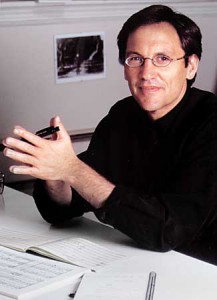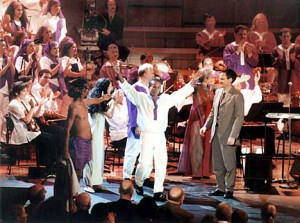 Osvaldo Golijov.
Osvaldo Golijov.
“The idea of a string quartet gives him nightmares, I think!
But most composers go through that with string quartets.” (Geoff Nuttall)
“They came on stage like hungry cannibals and I felt a strange sense of tranquility,” said Argentina-born composer Osvaldo Golijov when the SLSQ gave the première of his quartet Yiddishbbuk at Tanglewood in 1992. “For the first time in my life I was listening to what I had written being played as vividly as I heard it in my head.”
The cannibals did not consume the composer. They recorded the work he wrote for them, championed other Golijov works and received two Grammy nominations along the way.
Warming to the memory of the cannibals and paraphrasing American writer John Gardner, St. Lawrence violinist Geoff Nuttall likens playing a string quartet “to swimming in a tank full of sharks, where any false move you make may result in the loss of a limb. . . I like to approach the concert experience more like that, than playing at a drawing room cocktail party,” he says.
Nuttall’s exuberance and vitality on stage {he’s been known to fall off his chair] will be familiar to MusicTORONTO regulars over the past 16 seasons. Speaking from his California home November 11, 2011, Nuttall described the birthing pains of the brand new Golijov string quartet the SLSQ will be bring to Toronto next month – all the while waiting the arrival of his own Op. 2, a second son, with his wife, violinist Livia Sohn.
Nuttall. Costanza. St. John. Robertson
Nuttall: “He’s incredibly inspiring.
It’s a great symbiotic relationship for the quartet.”
“I honestly think Osvaldo is one of the most gifted musicians on the planet; when he’s gone there’s nobody else like him,” Nuttall says of his close friend, whose wedding he played at this past summer. “He’s talked about writing another quartet for us for 15 years. And we’ve had the money in place for almost 10 years.” The première of the quartet, co-commissioned by Carnegie Hall and Stanford Lively Arts was scheduled for Carnegie Hall last spring. Golijov, an uncompromising perfectionist, failed to meet the deadline.
In 2010, the League of American Orchestras put Golijov at the top of their list of ‘the hottest composers in the world.’
An unprecedented 35 orchestras banded together to commission Golijov’s ‘Sidereus’.
“He needs to work through ideas and sketches,” says Nuttall. “He’s not a facile composer.
It has been tough for him the last four or five years.
It’s been a struggle and I thought we should try to help him.”
As Director for Chamber Music at Spoleto Festival USA, Nuttall planned a mini-Golijov festival with the composer in residence.
The festival came and went, with no new quartet, but much discussion of the proposed piece over a bottle or two of wine.
“Then he came to our annual Chamber Music Seminar at Stanford and brought some music! It was amazing. He brought a whole movement. We played it for the students in a workshop. It became the opening movement of the new quartet.”
Golijov is currently at work on an opera, for the Met in 2014, with director Robert LePage.
“It’s an exploration of the work of both Galileo and Stephen Hawking,” says Golijov.
The initial concept of the quartet was as a large-scale piece based on the Book of Ecclesiastes – the subtitle Kohelet (a Hebrew word referring to the speaker in the Ecclesiastes) is given in the MusicTORONTO program booklet.
Golijov then arrived for the scheduled Stanford première of the quartet with a second movement. “We worked eight hours on Saturday, the day before the concert, had a great dinner, partied a bit. When he woke up on Sunday, he said ‘I have some new ideas.’ So at the dress rehearsal, he’s changing things and adding ideas. You really get the sense that it is a fluid thing. He’s frustrated by the limitations of notation, basically. ‘It’s impossible to write down,’ he’ll say. But when he’s in the room, he has an amazingly powerful way of expressing it, through singing, gesture, evocative analogies, and so on. He’s a very powerful presence when you’re working on a piece,” Nuttall says.
The level of trust between composer and performers is palpable: a two-way creative relationship with a single goal in mind. “Our working relationship is unlike any other I’ve had with a composer in terms of the give and take, the communal respect and trust. I think he works that way pretty consistently with his other musicians,” says Nuttall, mentioning soprano Dawn Upshaw, cellist Yo-Yo Ma and others.
“A dark Jesus, not a pale European Jesus,”
Golijov says of his hugely popular
La Pasión según San Marcos,
based on Latin American folk and popular styles.
At the Stanford première of the quartet, Golijov spoke to the audience, describing the ‘mountain of rejected ideas’ on his piano. “The piece is far from finished,” he added. Musician and critic Beeri Moalem reported how Golijov also spoke about a unifying element in the two movements. Melodies by Schubert are slowed down and ‘stretched almost to the breaking point’ (in the composer’s words), flying high and detached, while the rest of the ensemble is busy with all sorts of activity. Golijov likened this, Moalem says, to riding a motorcycle: the mind floats in freedom, enjoying the ride (i.e. the soaring melody) even while the engine churns noisily and the tires bump up against the rocks and the dirt. Golijov also extends the analogy to Ecclesiastes where the speaker seeks to transcend the cycle of miserable grinding reality.
Nuttall is intrigued how Golijov can draw from minimalism in the opening movement, add his customary ‘grit and emotional stuff’ and still come out speaking with his own voice. He describes the second movement as ‘incredibly beautiful and almost Mahleresque’ in the way that the composer suspends a seamless slow violin line over shifting harmonies. Expressing satisfaction with the quartet as it now stands – two movements and 17 minutes – Nuttall says: “I’d be surprised, though, if we have the very final version.”
St. Lawrence Quartet (with Mark Fewer sitting in for Geoff Nuttall). Beethoven/Golijov/Schubert. Thursday December 1, 2011 – 8:00 pm. Jane Mallett Theatre, St. Lawrence Centre for the Arts, 27 Front Street East, Toronto
Posted by Keith Horner



